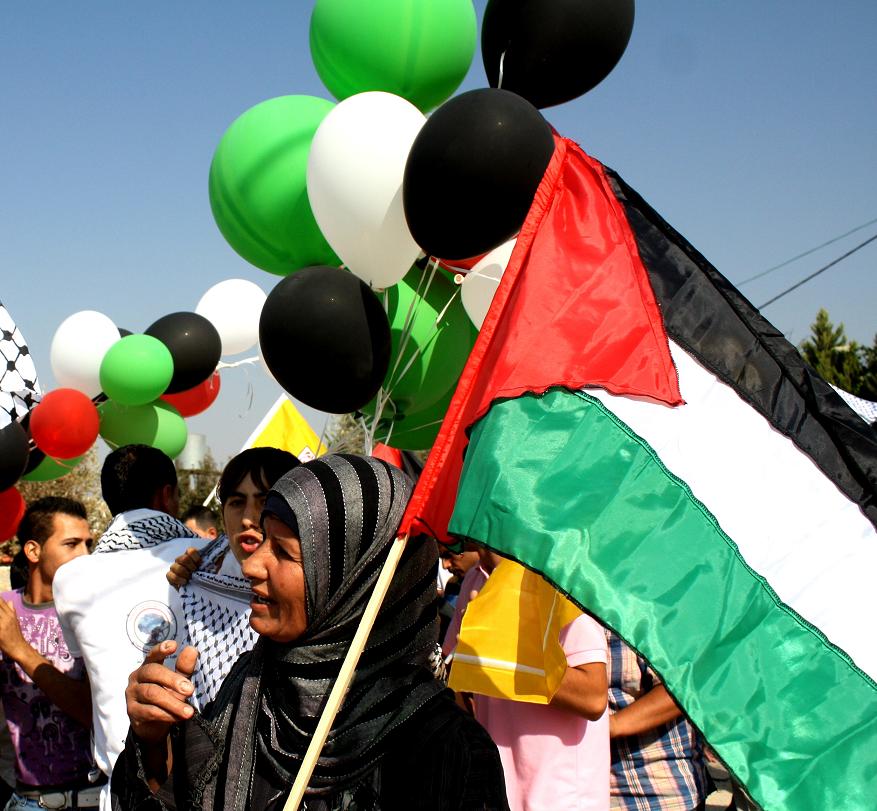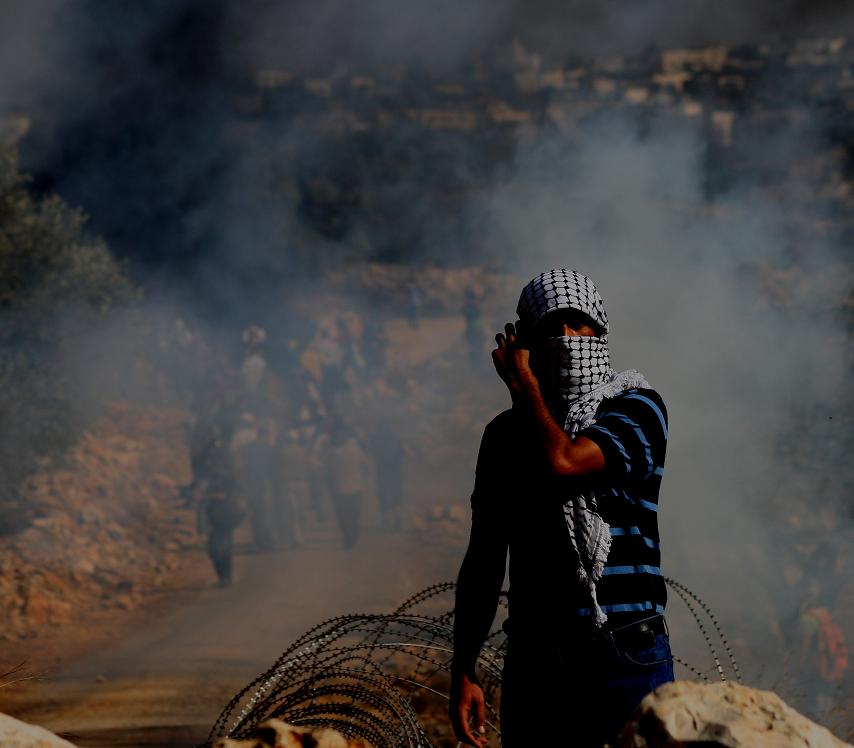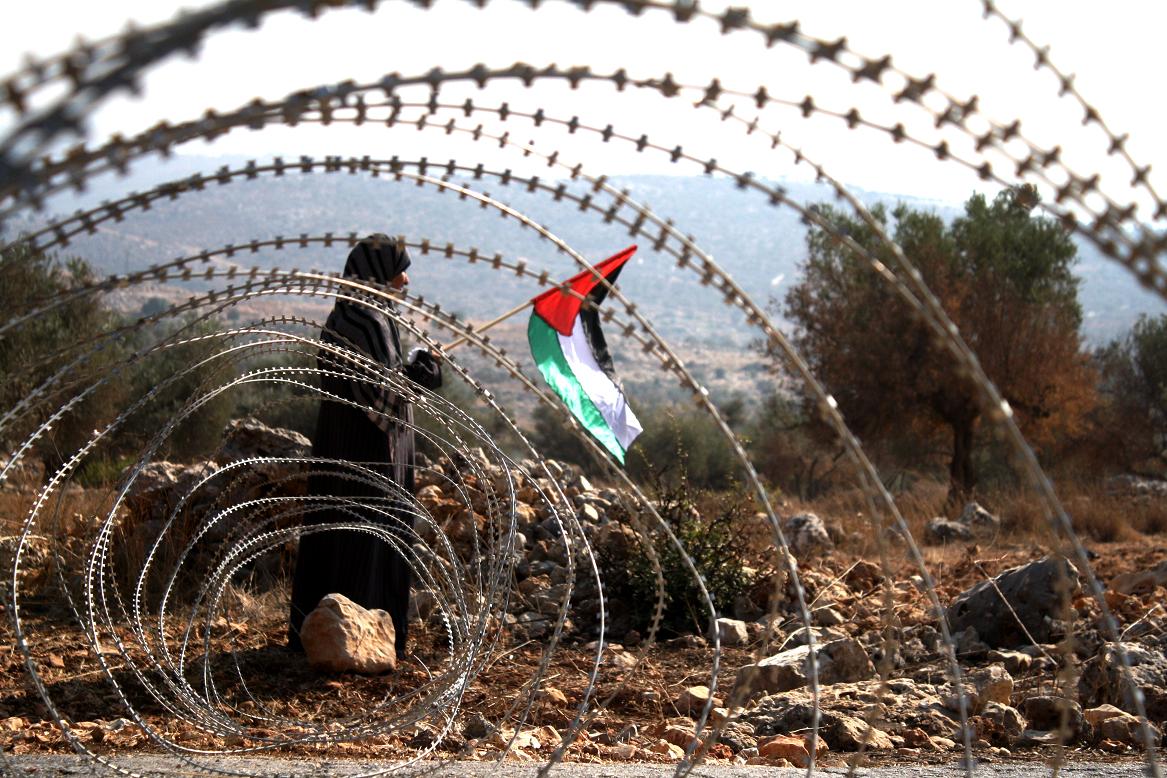
Volume [7]
No. [2]
December 2010
 |
||
|
Volume [7]
|
No. [2]
|
December 2010
|
Why Should You Be An Activist in Palestine?
|
|
The moral reason to go to Palestine
cannot be disputed. Pal- estinians are currently in their
seventh decade of military occupation and are subject to the most
brutal immiseration and politicide. Only the most jaded conscience can
fail to be moved at the sight of the horrors perpetrated. Furthermore,
the Occu- pation is personal to Americans. The F-16s that rain death
over the Gaza Strip come with “Made in USA” labels. A demonstion in Bil'in (photo: Hamde Abo Rahma) However, if compassion drives us, emotions alone cannot be the reason to go. One argument of IDF intellectual hitmen has been “but why do you unfairly target Israel when there are so many other tragic situations in the world?”. They have a perverse point. Unmanned drones wreak havoc in Pakistan, and ethnic cleansing plagues the Congo. If we are, however, to avoid comparing victims to see who is “more oppressed,” then we have to consider the strategic dimension. Internationals provide an important source
of support for these currents of resistance within the Palestinian
movement by getting out their message to the wider international sphere.
One can imagine when it would be correct not to go to Palestine. If the Palestinian political movement were non-existent, then internationals could accidentally become neo-colonial tourists who unconsciously steal the political space from Palestinians. Furthermore, there are moments when staying at home is much more effective than travel abroad. American activism on foreign policy is testament to the virtues of political work from without. Finally, the simplest reason is that one’s work could be simply ineffective in changing the situation. A status review is therefore in order. In the US, there have been noticeable, albeit glacial, changes in perceptions of Israel and the Occupation. Although today we find rigged debates favoring Israel, before there would be no debate at all. Can one imagine William Kristof ten years ago writing sympathetic portraits of Palestinian non-violent struggle? Even Tom Friedman recently wrote that Israel “really is behaving like a spoiled child.” These cracks in the propaganda machine show that going to Palestine can be critical. Firsthand observation not only strengthens one’s voice, but the act of traveling makes it clear that international pressures will not go away. The PR blows that Israel has suffered over the Gaza War and the Mavi Mavimara show that participatory actions have entered a critical phase.  A demonstion in Bil'in (photo: Hamde Abo Rahma) A second consideration is the political landscape within the Occupied Territories themselves. Here, despite their bravery, Palestinians are politically extremely weak. Israel’s efforts at politicide have successfully fragmented Palestinian society. If Palestinians are subject to increasing Israeli repression, their own officialdom inspires no confidence. As Karma Nablusi laments in a recent issue of London Review of Books, “...the key people in Ramallah ... no longer discuss strategies of liberation but rather the huge business deals that prey on the public imagination.” If Fatah is a hollow shell of a resistance organization, Hamas is also not quite as advertised. Conversations I had in the West Bank and Jerusalem evinced disgust on the part of ordinary Palestinians for their leadership. |
Although there is no collective
policy for liberation, the gap is
partly filled by towns and villages across the West Bank, where popular
committees organize and coordinate nonviolent resistance. As expected,
however, the brave work of these committees meets with arrests and
bullets. Palestinian “Gandhis” languish in jail if they are not already
dead. In the West Bank village of Iraq Burin, soldiers called a popular
committee one August weekend and threatened to kill anyone who set foot
on the mountain where demonstrations are normally held. Two months
earlier, the soldiers had made a similar call and murdered two young
men when the Palestinians refused to call off the protest.
Internationals provide an important source of support for these
currents of resistance by getting out their message to the wider
international
sphere. They are no substitute for Palestinian initiatives, but
internationalization of the struggle is a key strategy when isolation
would be catastrophic. It is easy to dismiss our efforts as a
futile exercise. However, it is the cumulative work that brings the
change.
Is international participation effective? My fellow activists and I often joked that all we did was run from village to village only to be tear gassed. It is easy to dismiss our efforts as a futile exercise. However, it is the cumulative work that brings the change. Of all of ISM’s work, the neighborhood watch in Sheikh Jarrah has been one of its most long-term and dedicated projects. Situated between the Old City and the East Jerusalem settlements of Pisgat Ze’Ev and French Hill, the neighborhood is a strategic location for Israel. Its colonization would create territorial continuity for the settlements but split up Palestinian land. The twenty year process of legal and bureaucratic expropriation and displacement of Sheikh Jarrah’s residents has created an extremely tense situation in which settlers and Palestinians live next to each other. Every day, settlers file false complaints against local residents and activists, tear out fencing, break windows, puncture tires, provoke scuffles, and, in a particularly nauseating example, once stole children’s games from a yard. During my stay, one resident had his tires slashed which resulted in him being fired by the Israeli company for which he worked, on the obscene logic that the potential for him to be victimized again by a racist attack made him a liability for the company. However, this is nothing compared to the violence less than a mile away in Silwan. The “City of David”, as it has been relabeled by settlers, sometimes resembles more a war zone than a neighborhood. In late September, it was the site of demonstrations and brutal police repression including the murder of one man and two children. The robust presence of internationals in Sheikh Jarrah versus very little presence in Silwan helps to, in part, explain the difference. International presence helps temper violence since Israel, which could not care less about Palestinians, is very PR conscious.  A demonstion in Bil'in (photo: Hamde Abo Rahma) It is the same story in the West Bank itself. Army repression and intimidation occurs everywhere, but murder of Palestinians is more common in the remote villages than in the villages which have internationals. Of course, there is something pathetic in such an evaluation of success, but it is safe to say that, in a land saturated by violence, the difference between tear gas and live ammunition is significant enough to not be scoffed at. International activism at this stage is precisely the best
way one can express solidarity for the new world that is not yet born.
The reason, therefore, that international activists are effective is that the situation is both worse and better than it could be. It is worse insofar as the Palestinian political movement is weaker than ever, but it is better in that Israeli vulnerability and incompetence are also on the rise. The political philosopher Hannah Arendt said that force is not a sign of power but its very absence. In this in-between space, where things might seem more desperate than ever, we are entering the decisive stage in the Palestinian struggle for freedom and self-determination. International activism at this stage is precisely the best way one can express solidarity for the new world that is not yet born. Cide is a graduate student in international relations at the University of Chicago. He spent a month and a half in Palestine last summer as an ISM volunteer. |